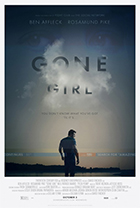Gone Girl
|  Gone Girl is David Fincher doing Alfred Hitchcock, complete with a (possibly) wrongly accused man, a (possibly) icy blonde femme fatale, unexpected plot twists that turn everything inside out, and heavy dollops of misanthropy (definitely) and misogyny (possibly). To say it is a complex film—morally, emotionally, and visually, in roughly that order—is an understatement of grand proportions, which is why its Lifetime Movie Network shell is such an intriguing bit of misdirection. Just as Hitchcock produced his most unconventional and memorable work in the most conventional of genres (particularly 1958’s twisted romantic thriller Vertigo, a film to which Gone Girl owes a great debt), Fincher is at his most masterful when reworking the familiar—the police procedural in Seven (1995) and Zodiac (2007), the mystery thriller in The Game (1997), the biopic in The Social Network (2010)—and Gone Girl will surely rank as one of his strongest films, especially after the vague sense of disappointment that accompanied The Girl With the Dragon Tattoo (2011). Gone Girl is David Fincher doing Alfred Hitchcock, complete with a (possibly) wrongly accused man, a (possibly) icy blonde femme fatale, unexpected plot twists that turn everything inside out, and heavy dollops of misanthropy (definitely) and misogyny (possibly). To say it is a complex film—morally, emotionally, and visually, in roughly that order—is an understatement of grand proportions, which is why its Lifetime Movie Network shell is such an intriguing bit of misdirection. Just as Hitchcock produced his most unconventional and memorable work in the most conventional of genres (particularly 1958’s twisted romantic thriller Vertigo, a film to which Gone Girl owes a great debt), Fincher is at his most masterful when reworking the familiar—the police procedural in Seven (1995) and Zodiac (2007), the mystery thriller in The Game (1997), the biopic in The Social Network (2010)—and Gone Girl will surely rank as one of his strongest films, especially after the vague sense of disappointment that accompanied The Girl With the Dragon Tattoo (2011).Based on the 2012 bestseller by Gillian Flynn, Gone Girl takes place in a small, nondescript Missouri town. It centers on the mysterious disappearance of Amy Dunne (Rosamund Pike) and the media circus that ensues when her husband, Nick (Ben Affleck), emerges as one of the primary suspects. It is revealed in the opening moments that their five-year marriage is on the rocks, which makes the case against Nick seem even stronger (it doesn’t help that the film opens with him ruminating in voice-over narration about the cracking of her skull over a close-up of Amy’s seemingly serene face). Discussing much more of the film’s plot without slipping into spoiler territory will be a difficult endeavor, so in appropriately elliptical fashion I can suggest that not everything is as it first appears (natch), and in fact, one of the film’s greatest strengths is the way it constantly recalibrates our appraisal of both characters and the situations in which they find themselves. It’s a film that never allows you to get comfortable, even if you think you know what’s coming. Hitchcock famously experimented with duplicitous narration in Stage Fright (1940), and Fincher follows that lead in ways that are simultaneously confounding and revealing; just because we hear a character telling us something and we see it enacted before our eyes doesn’t necessarily make it the truth. Gone Girl is an unraveling onion of truth and mistruths, lies and conceits, misdirection and misinformation, which is interesting on a formal level, but is not necessarily emotionally gripping. This is where Fincher’s artistry comes in: He uses the plot twists to manipulate our identification, shifting our allegiance from character to character as they move from being victims to victimizers and maybe even back again. The film is gripping in a way that is morally challenging in the best Hitchcockian sense, as we find ourselves quietly rooting for the worst to happen while simultaneously feeling empathy for a character who is nothing short of sociopathic. Fincher has always gotten grand kudos for his visual style—he has influenced the look of Hollywood cinema more so than any director since Ridley Scott in the early ’80s—but his work with characters and emotion is often dismissed or at least undervalued. This is a glaring omission given the fantastic work he has done with challenging characters, notably Mark Zuckerberg’s coiled mess of smugness and insecurity in The Social Network and Robert Graysmith’s slow-burn obsession in Zodiac. Gone Girl is filled with such difficult characters, and the simplistic response is to deem them all “unlikeable.” In a sense this is true, but only to the extent that they are deeply flawed, but never in ways that allow us to be detached (this is why so many people are bothered by the film’s less-than-rosy ending). Rather, as in the best of the classic film noir and Hitchcock thrillers, their flaws draw us in and invite us to dig beneath the obvious, manicured surfaces. Truth, the film reminds us, resides in the darkest, deepest recesses. Ben Affleck has often been criticized for appearing slightly smug or not entirely engaged in his performances, qualities that make him perfectly cast as Nick, a rather ordinary guy thrust into an extraordinary situation for which he is ill-equipped to deal (he doesn’t respond well to the media, acts awkwardly around cameras, and gets drawn all too easily into compromising situations). One of the primary challenges of Affleck’s performance, which also applies to Rosamund Pike’s, is that he is essentially playing multiple characters, as our view of Nick is inflected by the various forms of narration the film employs. At times we appear to be watching his and Amy’s marriage through an objective lens, while at other times we are viewing it specifically through the lens of Amy’s diary entries. Pike has an even trickier role for reasons that can’t be disclosed here without giving away important information, but suffice it to say that she must walk a thin line between playing an East Coast ice queen and a tender-hearted victim of spousal neglect, if not outright abuse. Nick and Amy’s crumbling marriage and her disappearance involve a number of other crucial characters, including Margo (Carrie Coon), Nick’s twin sister and confidante who turns out to be the film’s true moral voice; Rhonda Boney (Kim Dickens), the no-nonsense police detective assigned the case who is simultaneously one step ahead and several steps behind of what is going on; Desi Collings (Neil Patrick Harris), a wealthy and possibly unhinged former boyfriend; and Tanner Bolt (Tyler Perry), a powerful defense attorney who is immediately drawn to Nick’s case because, as he puts it, he wins the cases that are unwinnable. Much of Gone Girl plays as a sharp critique of the media and the way they play up volatile criminal cases for ratings and sensationalism, which reduces the human beings involved to puppets on a stage. Some of this qualifies as easy target material—particularly Missi Pyle’s knee-jerk judgmental cable news host, who is a clear shot at CNN’s Nancy Grace—but Fincher weaves it so carefully into the film’s melodramatic and crime thriller textures that it all feels of a piece. Fincher keeps the visuals relatively subdued, in keeping with his tendency to become more and more subtle with each of his works, although there are a few moments of near operatic intensity, including a graphic merging of sex and death that arrives with such shocking, bloody suddenness that you can’t shake it for the rest of the film. Working again with cinematographer Jeff Cronenweth (their working relationship goes all the way back to George Michael’s “Freedom ’90” music video) and composers Trent Reznor and Atticus Ross (who won Oscars for their work on The Social Network), Fincher keeps the film moving constantly forward, never rushing, but not dawdling either. Cronenweth’s bruised imagery is gray and green, and the soundtrack pulses with electronic hums that feel primed to explode. There is a lot of plot to get through in Gone Girl, but the film’s pacing, like Zodiac’s, keeps it thoroughly engaging, which makes it feel shorter than it actually is. Unlike The Girl With the Dragon Tattoo, which never quite connected emotionally, Gone Girl gets completely under your skin, rattles your sense of what’s right and wrong, and generally undercuts any kind of moral pretense we might bring into the theater. It’s a troubling film, and Hitchcock would be proud. Copyright ©2014 James Kendrick Thoughts? E-mail James Kendrick All images copyright © 20th Century Fox |
Overall Rating: 


 (4)
(4)


